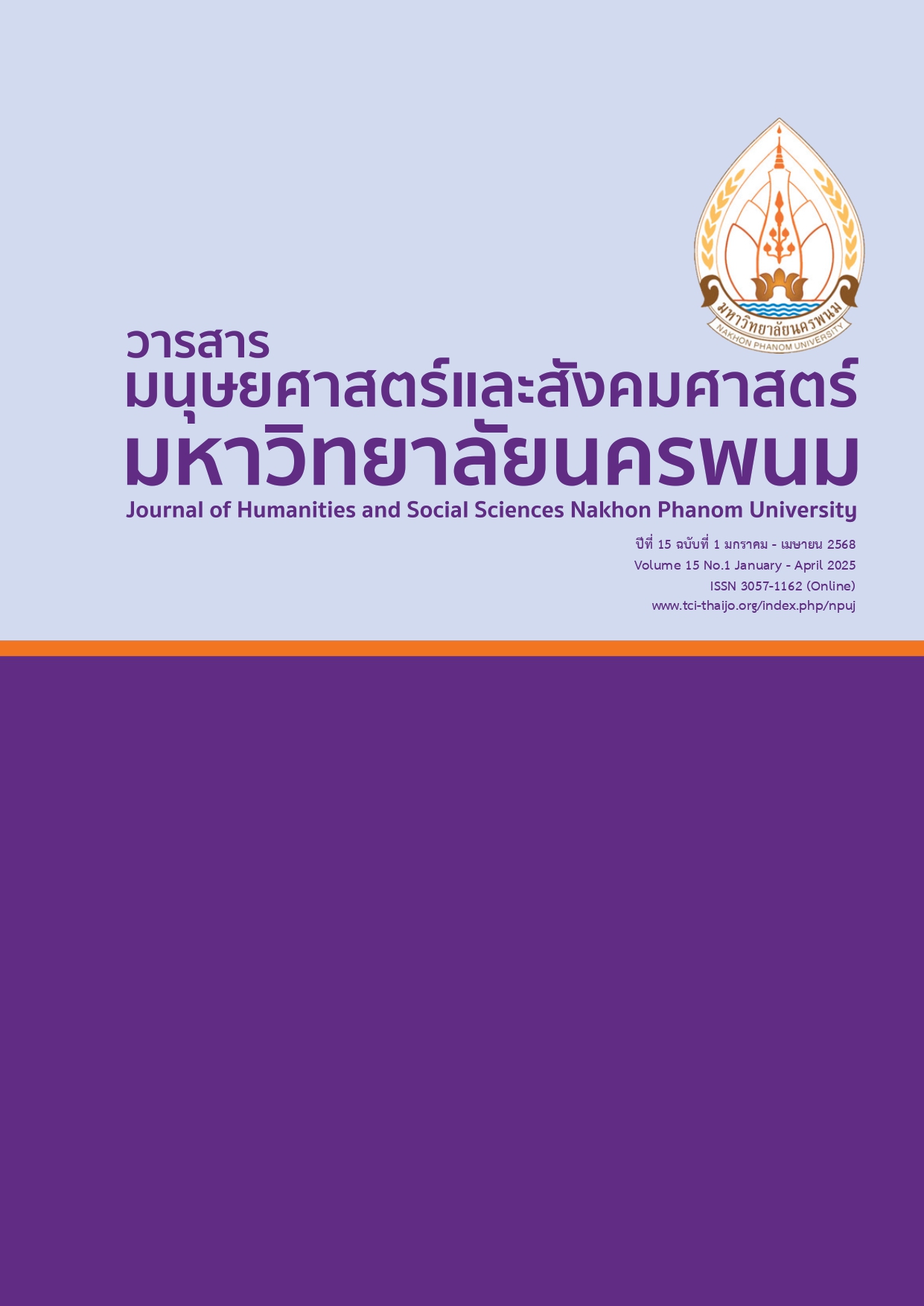The Development of Creative Writing Ability of Grade 10 Students Using Creativity-based Learning with ChatGPT
Main Article Content
Abstract
This research aims to develop creative writing ability for grade 10 students using creativity-based learning with ChatGPT to help the students increase a mean score of 70% or higher and to help at least 70% of students pass the prescribed criterion he target group consisted of 40 students from Grade 10/5 in the first semester of the academic year 2024 at Kaennakhonwitthayalai School using purposive sampling. This study was an action research with 3 action cycles. The research instruments consisted of 1) 6 lesson plans for 12 hours using creativity-based learning with ChatGPT, 2) a learning outcome record form, 3) a teacher and student behavior observation form, 4) a student interview form, 5) a post-cycle creative writing ability test, and 6) a creative writing ability test. The quantitative data was analyzed using mean (), standard deviation (S.D.), and percentage. The content analysis was used to analyze the qualitative data. The findings found that the student creative writing ability’s mean score was 15.43, or 77.13% of the full scores, and 31 students, or 75.00%, passed the criterion, which is higher than the prescribed criterion. The research results indicated that creativity-based learning (CBL) with ChatGPT allowed students to develop creative ideas in writing and receive useful feedback for improving creative writing ability to be more effective.
Article Details

This work is licensed under a Creative Commons Attribution-NonCommercial-NoDerivatives 4.0 International License.
References
Ahlitaqwa, W., Tamwaro, A., Rattana, R. & Manochphinyo, A. (2024). The Impact of Technological Tools on The English Writing Process for Thai Learners. Journal of Social Science and Cultural, 8(4), 268-280. https://so06.tci-thaijo.org/index.php/JSC/article/view/272868
Bozic, V. (2023). Chat GPT and education. Retrieved December 2023, from https://www.researchgate.net/ profile/Velibor-Bozic-2publication/369926506_ Chat_GPT_ and_education/links/64350844ad9b6d 17dc4d3a79/Chat-GPT-and-education.pdf
Cheewapan, A. (2004). Creative writing activities in elementary school. Chulalongkorn University.
Choomyen, C. (2022). Development of Creative Writing Ability of Grade 5 Students by Using Creativity - Based Learning Approach (Unpublished Master’s Thesis). Chiang Mai University, Chianh Mai, Thailand.
Kanphakdi, R. (2022). Effects of Instruction using Rhetorical and Collaborative Writing Approaches on Creative Writing Abilities of Upper Secondary school students (Unpublished Master’s thesis). Chulalongkorn University, Bangkok, Thailand.
Kemmis, S. & McTaggart, R. (1998). The Action Research Planner (3rd ed.). Deakin University.
Mingsiritham, K. (2023). ChatGPT and Education in the Digital Age. Silapakorn Education Research Journal, 15(2), 1-10. https://so05.tci-thaijo.org/index.php/suedureasearchjournal/article/download/269776/ 180591/1076249
Ministry of Education. (2008). Basic education core curriculum A.D. 2008. The agricultural Co-operative Federation of Thailand.
Noypracha, J. (2021). Development of health education learning using creative-based learning to enhance learning achievement and higher order thinking of secondary school students (Unpublished Master’s thesis). Chulalongkorn University, Bangkok, Thailand.
Pimpalub, P. (2022). Learning Management for Synectics Instruction model to Promote Creative Writing Ability of Grade 5 Students (Unpublished Master’s thesis). Maha sarakham University, Mahasarakham, Thailand.
Rukchaipanit, V. & Nimitpongkul, W. (2022). Creative Teaching, Enjoyable Learning in the 4.0+ Era. Se-Education.
Santhuenkaew, T. (2024). Using Artificial Intelligence Technology AI (Chat GPT) To Promote Writing Skills. Journal of Applied Education, 2(2), 45-58. https://so16.tci-thaijo.org/index.php/JAE/article/download/ 213/157/4309
Song, C. & Song, Y. (2023). Enhancing academic writing skills and motivation: assessing the efficacy of ChatGPT in AI-assisted language learning for EFL students. Frontiers in Psychol, 14(1), 1-14. https://doi.org/ 10.3389/fpsyg.2023.1260843
Subrkathok, W., Yahakorn, S. & Anaman, A. (2024). The Effects of Creativity-Based Learning Management on Creative Writing Ability and Attitude toward Thai Language of Grade 6 Students in schools under Nakhon Ratchasima Primary Educational service area office 3. Journal of Buddhistic Sociology, 9(2), 13-28. https://so06.tci-thaijo.org/index.php/BSJ/article/view/268435
Sungkachan, J. (2022). Learning Management for Cooperative Integrated Reading and Composition to Promote Creative Writing Ability of Grade 5 Students (Unpublished Master’s thesis). Maha sarakham University, Mahasarakham, Thailand.
Udomsuk, O. (2021). The Learning Achievement By Using Creativity-Based Learning (CBL) With Infographic Media in “Krabphrachaisuriya” Thai Literature Learning Management of Mattayomsuksa 1 Students (Unpublished Master’s thesis). Naresuan University, Phitsanulok, Thailand.
Walumas, C. & Witchayapakorn, K. (2024). Development of Communication Writing Ability’s Grade 6 Students with Creativity-Based Learning Technique and Game. The Journal of Sirindhornparithat, 25(1), 130-140. https://so06.tci-thaijo.org/index.php/jsrc/article/view/255778


